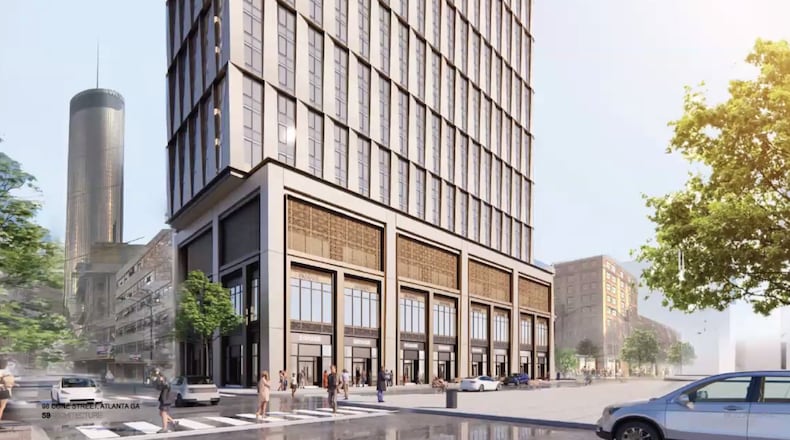One of the largest workforce housing projects in the Southeast is moving forward in downtown Atlanta, promising to provide affordable apartments to hundreds of educators and seniors.
New Jersey-based RBH Group received the greenlight Tuesday from the Development Authority of Fulton County to issue up to $370 million in federally tax-exempt bonds to redevelop 98 Cone St. into “Teachers Village Atlanta.” The 34-story project will replace a parking lot and parking deck a block from Centennial Olympic Park, offering rent-capped and subsidized housing.
Ron Beit, founding partner and CEO of RBH, said the Atlanta initiative is the third Teachers Village project, following developments in Newark, New Jersey, and Hartford, Connecticut. The Atlanta project, which was first proposed in 2019, will act as the poster child of their vision to provide educators with housing near transit in downtowns across the country.
“It’s going to be the largest middle-income housing project of its kind that we know of in the country,” Beit told DAFC’s board. “ … To be in the heart of downtown near as close as possible to two main MARTA lines in order for our teachers to be able to access as many schools as possible was very deliberate and intentional.”
The new development consists of 430 units, which vary between studios and two-bedroom apartments, according to materials shown during the meeting. As part of a purchase-and-sale agreement, RBH is under contract to buy the 0.25-acre property, develop the building and oversee its operations.
Credit: Google Maps
Credit: Google Maps
RBH said it will reserve 203 units as workforce housing at monthly rents considered affordable for people at or less than 120% of the area median income — about $90,360 for an individual or $129,000 for a household of four. About 40 of those workforce units will be reserved for people who make less than 80% of the AMI — about $60,240 for an individual or $86,000 for a household of four.
The remaining 227 units will be senior housing. Those apartments won’t have their rents tied to AMI percentages, but Beit said they aim to market those units at about a 15% discount from market rate.
The nearly 458,000-square-foot development will also include ground-floor retail space, an amenity floor and about 206 garage parking spaces.
Atlanta Public Schools officials, City Council members and Invest Atlanta, the city’s economic development arm, have backed the project. DAFC, which recently rebranded as Develop Fulton, unanimously approved the issuance of RBH’s bonds, which will not impact local property tax collections. Taxpayers are also not liable if RBH defaults, according to DAFC.
The project also qualified for low-income housing tax credits and $30 million in public financing incentives through Invest Atlanta.
Credit: Courtesy RBH Group
Credit: Courtesy RBH Group
Beit said the project’s financing has gone through several revisions because of the impacts of the COVID-19 pandemic and interest rate hikes during the past few years.
“The bond markets were just frozen, so we waited until after the new year to get back into the market,” he said.
Allison Dyer, the project’s bond counsel, anticipated the first $250 million in bonds will be issued in October, with the potential to issue the remaining bonds further into development. The development team expects to begin construction during this year’s fourth quarter and open the project by the third quarter of 2026.
The project will join several neighboring developments looking to transform downtown, many of them residential.
A $5 billion redevelopment project of the Gulch to be known as Centennial Yards is underway, with several towers under construction. South Downtown’s sprawling portfolio of century-old buildings are gaining momentum under new management. And a development team was selected early this year to convert the empty 2 Peachtree office tower into the city’s tallest residential building, with a focus on affordable rents.
The Georgia World Congress Center Authority is also evaluating more than $1 billion in potential projects across its sprawling campus near Mercedes-Benz Stadium, which is set to host eight World Cup matches in 2026.
Future of Downtown
This story is part of an occasional series by the AJC that looks at the future of Atlanta’s downtown. Several high-profile developments are poised to bring billions of dollars into the city’s core while it continues to grapple with the fallout of the COVID-19 pandemic and a challenging real estate financing market. Atlanta’s downtown will also garner international attention when soccer’s World Cup comes to town in 2026, providing a deadline for the city and downtown stakeholders to make promised improvements.
About the Author
Keep Reading
The Latest
Featured






